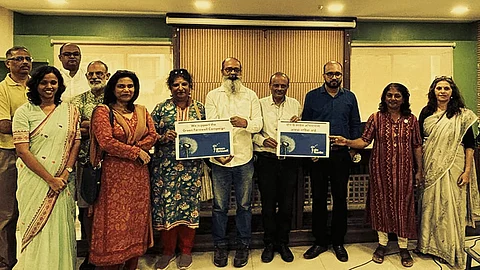

Pune Air Action Hub has introduced the ‘Green Farewell’ campaign, aiming to raise awareness about the environmental and health impacts of traditional wood-based cremation and promote the use of electric and gas-based alternatives.
The campaign encourages citizens to sign up for a registry, indicating their preference for eco-friendly cremation methods.
Each wood-based cremation requires two fully grown trees, and India cuts down approximately 5 to 6 crore trees annually to meet the demand for wood for cremations.
In Pune alone, around 373 out of 855 cremations performed each month use wood, while 371 are conducted using electricity and 172 using gas. Wood cremations release harmful pollutants, including Particulate Matter (PM), sulfur dioxide (SO2), and nitrogen oxides (NOx), which pose serious health risks to the public.
Electric and gas cremation methods offer cleaner alternatives by operating at controlled temperatures, reducing emissions of harmful chemicals and heavy metals. These sustainable methods not only protect human health but also help conserve forests.
The Green Farewell campaign seeks to inform citizens about the benefits of cleaner cremation options and drive a shift in behavior.
A broader goal of the campaign is to advocate for the expansion of electric and gas-powered crematorium facilities across Pune, ensuring that every ward has access to these options. The campaign also aims to establish uniform guidelines for the management of crematoriums.
Those who wish to participate can fill out a simple online form, and their names will be added to the Green Farewell registry. Participants will receive a certificate, which they can share with their families to inform them of their choice. More information is available on the campaign’s website at https://greenfarewell.wordpress.com/.
Shweta Vernekar, a member of the Pune Air Action Hub, noted that out of the approximately 50 crematoriums in Pune, only six offer electric cremation, while 15 have gas-powered facilities. With 44% of citizens still choosing wood-based cremation, there is a clear need to shift to more sustainable alternatives.
Supporting the campaign, former Rajya Sabha member Vandana Chavan emphasized the importance of increasing public awareness about the environmental and health benefits of eco-friendly cremation.
She highlighted that the Hub conducted a crematorium survey last year and shared recommendations with the Pune Municipal Corporation (PMC).
Pulmonologist Dr. Swapnil Kulkarni, Director of Birth and Breath Clinics, further stressed the health risks of wood cremations, noting that wood-burning emissions are more hazardous than diesel fumes.
Exposure to these pollutants can harm fetal development, lower birth weight, and increase the risk of asthma. He also linked wood smoke pollution to serious diseases such as lung cancer, heart disease, and diabetes.
PMC Environment Officer Mangesh Dighe announced plans to introduce Air Pollution Control (APC) systems for wood pyres under the 15th Finance Commission and establish more electric and gas crematoriums in newly incorporated villages.
Another Hub member, Sharmila Deo, reiterated the importance of promoting sustainable cremation practices and expanding eco-friendly facilities across the city.
